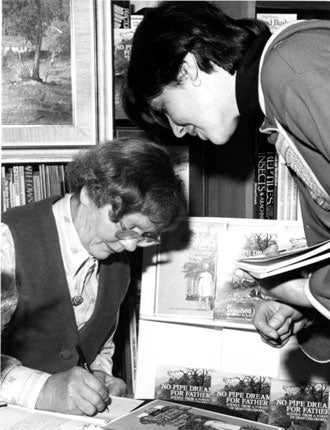Winifred Foley, the author who put the Forest of Dean on the literary map, died aged 94 just as her perennial best-seller A Child of the Forest was republished, on its 30th anniversary.
The book, now renamed Full Hearts & Empty Bellies: a 1920s childhood from the Forest of Dean to the streets of London, was originally published in 1974 when Winifred was already 60.
Winnie had begun jotting her childhood memories in exercise books, and sent some of them to the BBC Bristol radio producer Pamela Howe. The scripts became a Woman's Hour serial, their (largely) direct speech form making them much more animated than other rural memoirs. Indeed, her memoirs were so lively that, when the producers arranged for the BBC to publish them as a book, some suggested that Foley could not have written it herself.
"I know from publishing her second book that she was perfectly capable of writing herself," Coleford's Forest Bookshop owner and publisher Doug McLean said. "Like any manuscript it probably benefited from editing, but the talent was all hers." And in her introduction to A Child..., paying tribute to all those who saw her into print, she recognises that, "I cannot claim this book to be 'all my own work'".
Winifred Mason was born in the hamlet of Brierley, near Cinderford, to Charlie and Margaret Mason in 1914, and was known within the family as "Poll". Her father was a miner, mostly self-educated and thoughtful. He was blacklisted by mine owners for his role in the 1920s strikes, so work was hard to come by and the family suffered even greater hardships than the generality of mining families in that decade. He later died in a mining accident in 1945, when Winifred was 30.
The women of the families had to be as tough as the men. Much of Winifred's early narrative concerns her mother's humiliation in cadging from (mostly sympathetic) shopkeepers and tradesmen. Like others, the family depended on their cottage back garden for vegetables and fruit – and pig. Child... is the first impressionistic account of the importance of the pig for winter food in the local domestic economy. The surrounding woodlands also offered wood for the small range providing heat, hot water and cooking.
Foley also captured the unique local dialect and vernacular phraseology. A typical line from her small brother during a hot afternoon walking to Granny and Grancher's cottage through the woods is: "Phew, I be as 'ot as a fresh 'osses turd."
Like other girls, Foley had no prospect of a job within the Forest. With schooling ending at 14, she, like others, went off to work as a maid. Many went to Cheltenham, coming back to their families for their Sunday day off.
Sent to London, Foley was desperately homesick. She was only rescued from this and a similarly gruesome position on a Welsh farm when, in the 1930s, she gained a job as a maid in a women's college.
She also met her future husband, Syd. The two were well-matched; he stolid and she loquacious. They had four children, three sons and a daughter, and returned to a cottage on the fringes of the Forest of Dean after the war.
After the success of Child of the Forest, she followed it with No Pipe Dreams for Father (1977) and Back to the Forest (1981) – and moved to a more capacious residence beneath the local May Hill landmark. A Child having sold an astonishing half a million copies, the trio were published by the Oxford University Press as The Forest Trilogy (1992). A final collection of memories, In and Out of the Forest (1984) also briefly became a best-seller.
After her husband died in 1998, Foley began writing a series of romantic novels. Village Fates (2000) was followed by Prejudice and Pride (2005), To Kill for Love (2006) and, only two years ago, Two Men and a Maiden.
A national newspaper four-part serialisation at the end of March brought her early life and hard times to a wider audience than ever, while Woman's Hour on Radio 4 broadcast a recent interview that had been prepared to coincide with the 30th anniversary of the original publication.
After Syd died in 1998 she lived in a Cheltenham flat near to one of her sons and family. She counted 10 grandchildren and 12 great-grandchildren among her progeny.
Winifred Mary Mason, writer: born Brierly, Gloucestershire 25 July 1914; married Syd Foley (died 1998; three sons, one daughter); died Cheltenham 21 March 2009.

Join our commenting forum
Join thought-provoking conversations, follow other Independent readers and see their replies
Comments